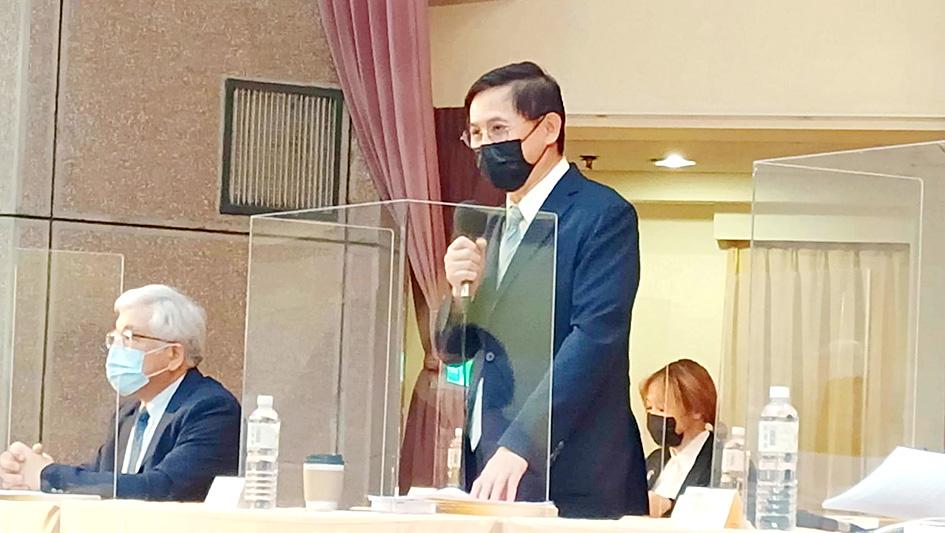Pegatron Corp (和碩), one of Apple Inc’s iPhone assemblers, yesterday said it is planning to expand manufacturing sites in Vietnam, India and North America to meet customer demand for production diversification, amid supply chain chaos attributable to the fallout of the COVID-19 pandemic.
The unpredictable effects of COVID-19 and unstable supply chains have increased uncertainty worldwide regarding consumer demand and the shipping of products, Pegatron said in its annual report.
“Pegatron will continue monitoring the supply of key components and working closely with its suppliers to optimize capacity allocations,” the company said.

Photo: Huang Hao-chen, Taipei Times
The remarks came as the firm held its annual general meeting in Taipei, where shareholders approved the distribution of a cash dividend of NT$5 per share.
That represented a payout ratio of 64.85 percent based on the company’s earnings per share of NT$7.71 last year.
Pegatron’s board of directors last month approved a plan to invest an additional US$50.61 million to expand its manufacturing hub in North America, the company said in a regulatory filing.
Pegatron said it had already planned to invest US$164 million on production lines in North America so that it could accommodate an increase in orders in the region.
The company has factories in Taoyuan, as well as operations in Mexico, Indonesia and the Czech Republic, while China is still its most important manufacturing hub, with factories in Kunshan, Suzhou, Shanghai and Chongqing.
Pegatron expects an increase in demand for information technology products, especially commercial PCs, as people gradually return to the office, the annual report said, adding that the launch of Microsoft Corp’s Windows 11 operating system would stimulate PC replacement demand.
As communications products, such as smartphones, are affected by seasonal cycles, Pegatron said it plans to boost production efficiency and improve management to navigate the industry’s ups and downs.
Last quarter, communication products were the biggest revenue contributor, accounting for 60 percent of total revenue, the company said.
This year, Pegatron expects its automotive electronics business to contribute more revenue, thanks to an increase in orders.

PATENTS: MediaTek Inc said it would not comment on ongoing legal cases, but does not expect the legal action by Huawei to affect its business operations Smartphone integrated chips designer MediaTek Inc (聯發科) on Friday said that a lawsuit filed by Chinese smartphone brand Huawei Technologies Co (華為) over alleged patent infringements would have little impact on its operations. In an announcement posted on the Taiwan Stock Exchange, MediaTek said that it would not comment on an ongoing legal case. However, the company said that Huawei’s legal action would have little impact on its operations. MediaTek’s statement came after China-based PRIP Research said on Thursday that Huawei filed a lawsuit with a Chinese district court claiming that MediaTek infringed on its patents. The infringement mentioned in the lawsuit likely involved

Taipei is today suspending work, classes and its US$2.4 trillion stock market as Typhoon Gaemi approaches Taiwan with strong winds and heavy rain. The nation is not conducting securities, currency or fixed income trading, statements from its stock and currency exchanges said. Authorities had yesterday issued a warning that the storm could affect people on land and canceled some ship crossings and domestic flights. Taiwan Semiconductor Manufacturing Co (TSMC, 台積電) expects its local chipmaking fabs to maintain normal production, the company said in an e-mailed statement. The main chipmaker for Apple Inc and Nvidia Corp said it has activated routine typhoon alert

GROWTH: TSMC increased its projected revenue growth for this year to more than 25 percent, citing stronger-than-expected demand for AI devices and smartphones The Taiwan Institute of Economic Research (TIER, 台灣經濟研究院) yesterday raised its forecast for Taiwan’s GDP growth this year from 3.29 percent to 3.85 percent, as exports and private investment recovered faster than it predicted three months ago. The Taipei-based think tank also expects that Taiwan would see a 8.19 percent increase in exports this year, better than the 7.55 percent it projected in April, as US technology giants spent more money on artificial intelligence (AI) infrastructure and development. “There will be more AI servers going forward, but it remains to be seen if the momentum would extend to personal computers, smartphones and

Catastrophic computer outages caused by a software update from one company have once again exposed the dangers of global technological dependence on a handful of players, experts said on Friday. A flawed update sent out by the little-known security firm CrowdStrike Holdings Inc brought airlines, TV stations and myriad other aspects of daily life to a standstill. The outages affected companies or individuals that use CrowdStrike on the Microsoft Inc’s Windows platform. When they applied the update, the incompatible software crashed computers into a frozen state known as the “blue screen of death.” “Today CrowdStrike has become a household name, but not in